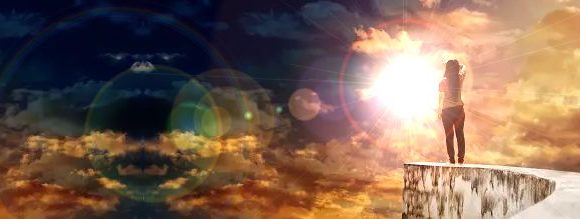taken from the book “The Mystery of Being by Tim Freke
Throughout the history of philosophy a great debate has raged between the spiritual and scientific perspectives on life. Over the centuries these perspectives have been understood in increasingly subtle ways and being given different names. But the fundamental debate has continued, because it’s about the nature of the primal ground of reality.
In this section I’m going to discuss these two perspectives in this three forms, which I will call materialism and mentalism. I want to do this because many people who are exploring spirituality struggle with trying to reconcile or choose between these perspectives and stop
This debate matters because it has huge implications for how we see the relationship between consciousness and the brain. Materialists see the brain as giving rise to consciousness, which seems to contradict the spiritual claim that essentially we are not the body’s. Here’s the way the argument between materialism and mentalism often plays itself out.
Materialism – materialists believe that matter is the ground of reality. Materialists point to the fact that consciousness is clearly linked to the brain and argue that consciousness is a byproduct of the physical body. Materialists claim that subjective being arises from objective being. I arises from it.
Mentalism – mentalists believe that consciousness is the ground of reality. Mentalists point to the fact that consciousness is the prerequisite for all experience and argue that the physical world is like a great dream arising within consciousness. Mentalists claim that objective being arises from subjective being. It arises from I.
It seems to me that both these perspectives are saying something important, yet they’re both seem problematic and outdated. Let’s start by looking at what’s wrong with materialism, because that’s easy to see.
What’s wrong with materialism?
Mentalists see consciousness as the ground of reality. Yet the evidence is overwhelming that consciousness is linked to the brain. If I take a sleeping tablet right now I will also the chemistry of my brain and very quickly consciousness will disappear. So how can consciousness be the ground of reality, when changing the chemistry of the brain can make consciousness disappear? That doesn’t make sense.
Awareness and consciousness
You might be surprised that I’m criticising mentalism, because it sounds much like the philosophy I’ve been articulating in this book. But there’s a crucial difference. So before going any further I want to clarify this difference for you.
I distinguish the terms awareness and consciousness, so that they refer to linked but distinct concepts. There’s no standard way of using these terms, so people use them in different ways. Indeed, in previous books I’ve used them in different ways myself. This can cause all sorts of confusion if you’re trying to compare what I’m saying here with what you’ve come across elsewhere. So let me take this opportunity to clearly state how I’m using these terms.
I used the term awareness to describe the primal ground from which everything is arising like a dream. I use the term consciousness to describe awareness when it is conscious of experience. The paradoxy of awareness is that it can be both conscious and unconscious. The unconscious field of awareness arises as centres of conscious awareness.
From a spiritual perspective I’ve been claiming that our experience arises within conscious awareness like a dream. But I’m not saying that consciousness is the ground of reality. I’m saying that centres of conscious arise within the field of unconsciousness awareness because of the physical body.
The primal ground is unconscious awareness that becomes conscious through the forms it dreams itself to be. Give the body a sleeping tablet and awareness will cease to be conscious through the form. Indeed simply go to sleep and awareness will cease to be conscious through the form. The primal ground is not conscious awareness, which is what we experience ourselves to be in the waking state; but rather, unconscious awareness into which we dissolve in the deep sleep state.
What’s wrong with materialism?
We’ve seen what’s wrong with mentalism and clarified how it’s different to the philosophy i’m articulating. Now let’s look at what’s wrong with the materialistic perspective. Materialists claim that consciousness is a byproduct of the brain, because matter is the ground of reality.
This is an attractive idea because it fits with common sense. But it’s hard to take seriously since science has discovered that on a deep level matter doesn’t exist, which is why so many of the great physicists have rejected materialism completely. However a more subtle form of materialism that sees matter arising from some sort of energetic field is still popular. But there are so many problems with this perspective. I’m going to focus on just one of them, because I enjoy this example.
When the quantum physicists looked deeply into the nature of matter, they discovered something astonishing. The quantum possibilities only come into a definite form when observed by consciousness. They concluded that consciousness collapses the quantum possibility into a seemingly solid universe. So without the conscious observer the world as we know it doesn’t exist.
This leaves us in a paralogical hall of mirrors. Let me take you through it.
Science has shown that consciousness is linked to the brain.
But science has also shown that the field of quantum possibilities only comes into a definite form when observed by consciousness.
So…. Hang on…. That means unless consciousness collapses, the quantum possibilities into a physical form there is no brain.
But if there is brain there’s no consciousness to collapse the quantum possibilities.
Holy moley … I’m getting dizzy!
Looked at one way, the brain creates consciousness. Looked at another way, consciousness creates the brain. How can we resolve this dilemma? By looking at things para-logically of course.
A Paralogical Alternative
I want to articulate a paralogical approach to the ground of reality. I agree with the brilliant physicist David Bohm who writes:
I would suggest that there is some ground, deeper and more subtle t are either mind or matter, and that they both enfold from this ground, which is beginning and ending of everything.
This has been the underlying philosophy in this book, which I’m clarifying in this chapter. I am suggesting that the ground of reality is the mystery of being, which is actually a term for something so mysterious we can’t say what it is … only that it is.
Here’s the way it looks to me.
The mystery of being is the ground of reality
The mystery of being is a primal field of potentiality that is arising as everything.
The paradoxity of being is that it manifests as subjective being and objective being …. Consciousness and matter… I and It.
I and It
How can this help us understand the relationship between consciousness and the brain? I suggest that they are the same thing seen from different complementary paralogical perspectives.
I is it and it is I
As life has evolved into more complex forms, greater consciousness has emerged at the same time, because consciousness and matter are the subjective and objective expressions of the paradoxity of being.
Two Perspectives on the Mystery of Being
In this book I’ve primarily been looking at the mystery of being from a ‘spiritual’ perspective. So I’ve been imagining it as a field of unconscious awareness, within which you and I are centres of consciousness. In this chapter I’ve suggested that the mystery of being can equally be imagined as the primary ‘energy’ field that science speculates about.
Here’s the way it looks to me.
The paradoxity of being is that it manifests as subjective being and objective being.
This means we can explore the mystery of being subjectively and objectively.
Spirituality examines things subjectively, so it sees the ground of reality as ‘energy’ that arises as ‘matter’.
So which is true? Both and neither.
The spiritual and scientific perspectives are paralogically complementary ways of thinking about the mystery of being.
Life is a paradoxical mystery that it can be helpful to see from both perspectives, but neither offer us the definitive truth … that’s impossible!
Conscious Being and Unconscious Being
Don’t be surprised if the ideas we’ve been exploring have made your head spin. I want to slightly rework Nield Bohr’s famous remark about quantum physics and say:
If you think you can talk about the paradoxity of being without feeling dizzy, you haven’t understood the first thing about it.
The depths of life are very difficult to understand with words. Yet the essential message that is important for our journey of awakening is simple. And it can be understood simultaneously from both spiritual and scientific perspectives.
The mystery of being is a primal oneness that is arising as everything.
You appear to be a separate individual, but essentially your being is one with the great mystery of being, which is manifesting as all beings.
You are a centre of conscious being arising within the field of unconscious being.








